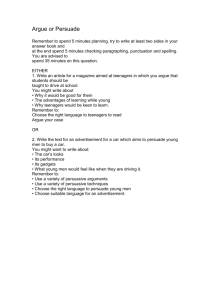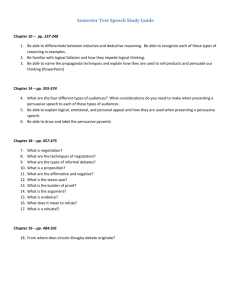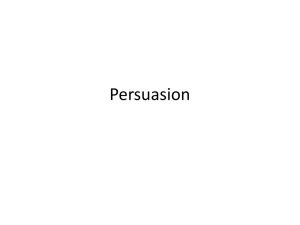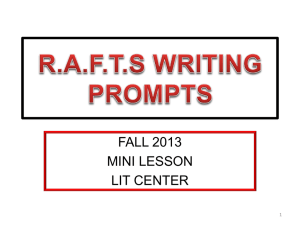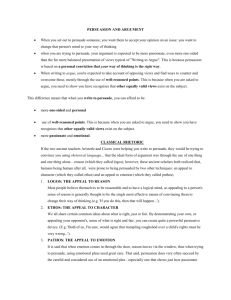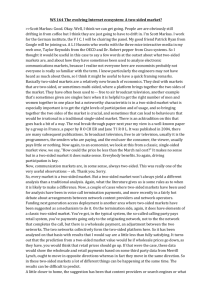Assignment Introduction and Topic Selection Guidelines:
advertisement
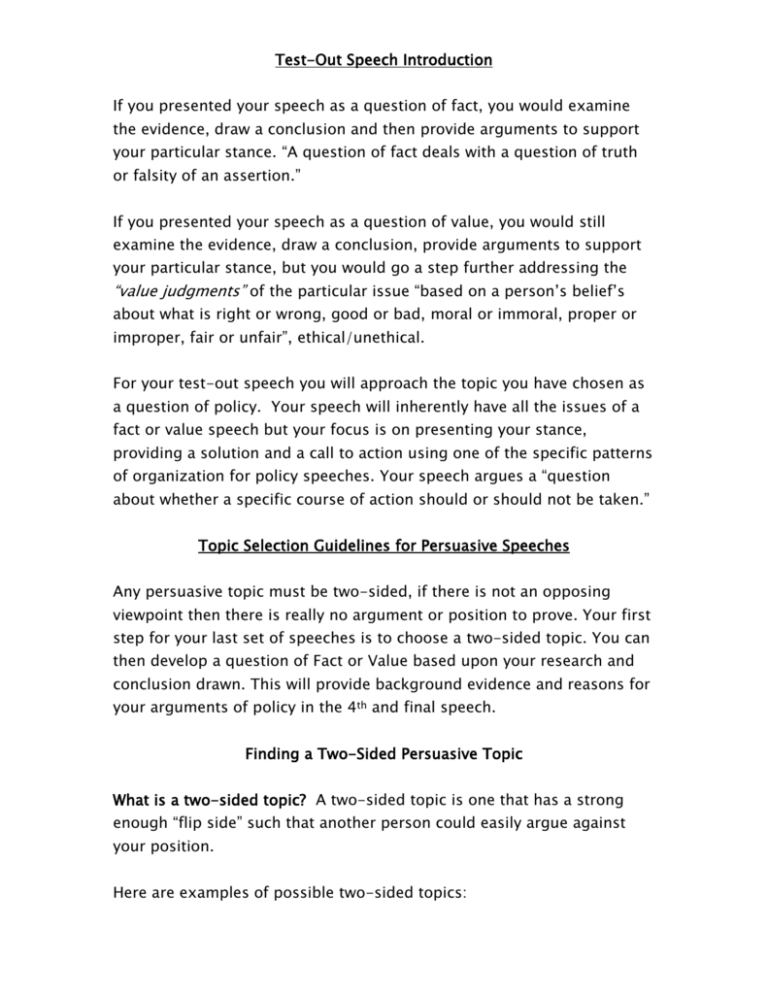
Test-Out Speech Introduction If you presented your speech as a question of fact, you would examine the evidence, draw a conclusion and then provide arguments to support your particular stance. “A question of fact deals with a question of truth or falsity of an assertion.” If you presented your speech as a question of value, you would still examine the evidence, draw a conclusion, provide arguments to support your particular stance, but you would go a step further addressing the “value judgments” of the particular issue “based on a person’s belief’s about what is right or wrong, good or bad, moral or immoral, proper or improper, fair or unfair”, ethical/unethical. For your test-out speech you will approach the topic you have chosen as a question of policy. Your speech will inherently have all the issues of a fact or value speech but your focus is on presenting your stance, providing a solution and a call to action using one of the specific patterns of organization for policy speeches. Your speech argues a “question about whether a specific course of action should or should not be taken.” Topic Selection Guidelines for Persuasive Speeches Any persuasive topic must be two-sided, if there is not an opposing viewpoint then there is really no argument or position to prove. Your first step for your last set of speeches is to choose a two-sided topic. You can then develop a question of Fact or Value based upon your research and conclusion drawn. This will provide background evidence and reasons for your arguments of policy in the 4th and final speech. Finding a Two-Sided Persuasive Topic What is a two-sided topic? A two-sided topic is one that has a strong enough “flip side” such that another person could easily argue against your position. Here are examples of possible two-sided topics: Open record adoption – some will argue yes, there is a need for open record adoption for medical purposes. Some will argue this is an evasion of privacy. Building a basketball arena in the downtown area – some will argue yes, downtown needs the arena. Others will argue the arena needs to be built in a more central location to the university. Women’s athletics are not supported well in our country – some will argue that yes, they are supported fine. Others will argue that no they are not supported well and need more support. These are only three examples of the many thousands of two-sided topics that you could address for your persuasive speeches. Use the topic finder provided with your text book, ask friends, ask your instructor, talk with a TA to help you brainstorm a two-sided topic. You may already have a two-sided topic in mind! Try it out on the next page with the flip side and evaluate if it is a good two-sided argument. Remember: A persuasive speech.... attempts to change the attitudes, actions, and / or beliefs of your audience members. Question of Fact or Value provides evidence and reasoning that a problem exists, its severity and effect upon the audience. A question of Policy provides a change in policy and provides a solution and how it will work. Usually containing the words should/should not Persuasive Argument:_____________________________________________________________ ________________________________________________________________________ Flip Side: ________________________________________________________________________ ________________________________________________________________________ Try another persuasive topic, if needed: Argument: ______________________________________________________________ ________________________________________________________________________ Flip Side: ______________________________________________________________ ________________________________________________________________________ If you still need help finding a two-sided topic, try these ideas: Ask yourself – What are the topics you argue or debate with friends or family members (or that you would like to argue and debate)? When you listen to, or watch the news, do you ever hear a story that makes you say to yourself, "Boy, I disagree with that or...I disagree with how that is being handled?” What makes you mad or angry or raise questions in your mind? Do you ever see a better way to do something? If so maybe that’s a possible topic Is there something (for example, a service, or a product) that is better than the current one being used? Perhaps that might be a topic. What did you hear on the news or read in the media that makes you think of different approaches. Maybe that could be a topic. Check out the library… o http://library.louisville.edu/research/hot/path.html -the "Hot Topics" page from the U of L library website. (It can also be accessed simply by going to the library homepage, then under “Articles,” click on “Article Databases by Topic.” There you’ll see the second item down, “Hot Topics.” Click on that. o On the right side of the Hot Topics page, under Print Sources, is the “Contemporary World Issue Series” and the “Opposing Viewpoints Series.” o In the middle of the page, under Internet Sources, is a Government Publication Hot Topics link to reputable government publications on the topics listed. o On the left side of the page, you will also find All Hot Topics o Database with Newsbank newspapers and abstracts. o CQ Researcher--Published by Congressional Quarterly, this has all kinds of political and legislative issues, usually presenting both sides. It is in the Reference Dept. under this call number: H 35 .E352. o Current Periodicals area, 2nd floor of Ekstrom --Look through current issues of Time and Newsweek and The Courier Journal (or go to their corresponding websites). o Sunday morning news shows (Meet the Press, Fox News Sunday) o Lou Dobbs, Money Line (CNN, 6 & 10 pm) o 60 Minutes (CBS), 20/20 (ABC), Nightline with Ted Koppel (ABC)
